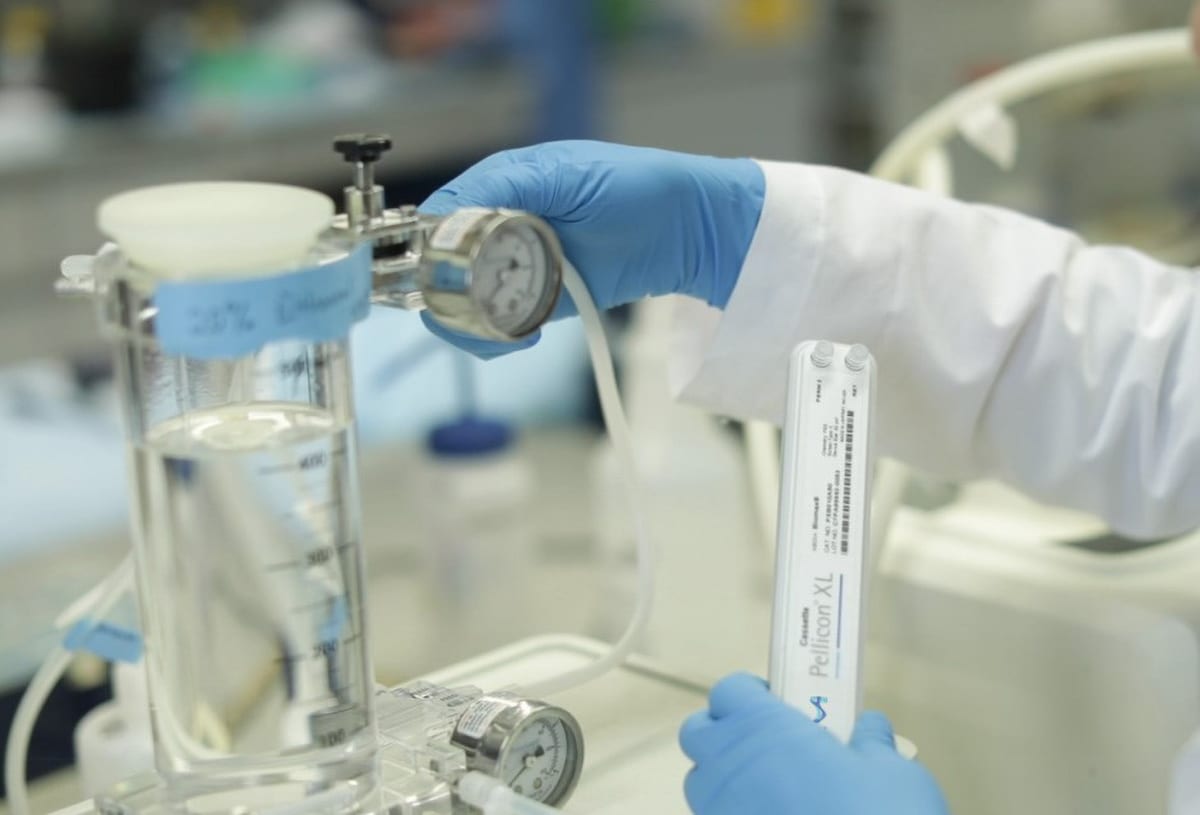DANVERS — Scientists in laboratories all over the world are working feverishly to come up with the vaccine that will do the same thing the flu shot you get every winter does: prevent you from getting sick with the COVID-19 virus.
The race against the clock is such that the Trump administration has created its own program to fast-start a vaccine, called “Operation Warp Speed.”
But there are other groups, and other companies, working toward the same end too. One of the ones helping those vaccine-makers is MilliporeSigma, a life science company with 600 people working in its Danvers location. Right now, MilliporeSigma is collaborating with Baylor College of Medicine and the Texas Children’s Hospital Center for Vaccine Development, to aid in the development of two COVID-19 vaccine candidates, one of which is expected to enter the first phase of clinical trials later this year. MilliporeSigma, which announced Wednesday that it is extending its agreement with Baylor, is focusing on helping the college with process development and manufacturing improvements, as part of the collaboration.
“Vaccine manufacturing is extremely complicated, so we are collaborating on a process-development approach to accelerate manufacturing of Baylor’s COVID-19 vaccine candidates,” said Udit Batra, CEO of MilliporeSigma, in a news release. “To fight this pandemic, we will need to produce an unprecedented amount of vaccine in a very short period of time, and we need as many approaches as possible to be successful.”
MilliporeSigma, which also has a location in Burlington, supports many customers working on COVID-19 projects, said spokeswoman Karen Tiano. It is also collaborating with the Jenner Institute, which is also developing a COVID-19 vaccine candidate.
MilliporeSigma’s products are currently being used by scientists to develop more than 45 vaccine candidates, more than 25 testing solutions, and more than 20 monoclonal antibodies, plasma products and antivirals used to fight COVID-19.
Even MilliporeSigma, however, has been affected by the virus. Last month, the New York Times reported that, because of staff illnesses and social distancing, the pandemic slashed productivity by 20 percent at the Danvers site this spring (Tiano says staffing is up to 90 percent capacity now, because of on-site testing). At the same time, demand was ramping up on the type of equipment MilliporeSigma provides at the facility — such as single-use assemblies, both custom-made and standard, that support the production of medications and vaccines worldwide. The equipment helps reduce contamination risk, improves resource efficiency and lowers labor costs, Tiano said.
One such product MillporeSigma manufactures is its Mobius single-use assembly, a ready-to-use device, containing bags, tubing, connectors and filters. The kit helps save time and reduces the risk of cross-contamination while increasing productivity between batches, Tiano said. Without it, many life-saving therapies would not be possible, she said.
“Demand went through the roof, and everybody wanted it yesterday,” Batra, told the Times, adding that he expanded production and asked other customers to accept delays to avoid becoming a bottleneck.
Batra said Wednesday there are no standard manufacturing templates or processes because of the complexity and diversity of various vaccines. This makes production a challenge for every organization racing to develop a safe and effective COVID-19 vaccine, he said.
Using key learnings from their ongoing collaboration on a schistosomiasis vaccine — a disease caused by parasitic flatworms — MilliporeSigma, along with researchers at Baylor and the Texas Children’s Hospital Center for Vaccine Development, will use the production process to advance two COVID-19 vaccine candidates, including one (the CoV RBD219-N1) that is expected to enter clinical trials later this year. MilliporeSigma will help to accelerate their suitability for large-scale manufacturing.
This collaboration will focus on improvements to production efficiency, yield, robustness, scalability and costs, Batra said.
The MilliporeSigma-Baylor teams hope to improve the manufacturing platform for the CoV RBD219-N1 vaccine candidate, which was originally developed to target Severe Acute Respiratory Syndrome (SARS) between 2011 and 2016. Additionally, they hope to develop a new manufacturing platform for a second COVID-19 vaccine candidate to shorten the time to enter into Phase 1 clinical trials. The goal is to develop a manufacturing process and steps that would lead to a scale-up approach suitable for pilot and later industrial production.
Researchers from the Texas Children’s Center for Vaccine Development first formed a partnership with MilliporeSigma’s process development scientists and biomanufacturing engineers in 2018 to advance vaccine development and production and enhance the response to outbreaks, such as COVID-19. Because the initial groundwork is laid through their existing process development platform work, the team can quickly shorten the time to the clinic, realizing a key goal.
MilliporeSigma’s Danvers site produces equipment used by drug makers to make vaccines and other medicines, Tiano said. This equipment includes a variety of custom and standard single-use assemblies that support the production of medications and vaccines around the world.
“These products allow biopharmaceutical manufacturers to implement technologies that help to reduce contamination risk, improve resource efficiency and lower labor costs,” she said. “One product line made there is our Mobius® single-use assemblies. These are ready-to-use, containing bags, tubing, connectors and filters.
“These help save time and reduce the risk of cross-contamination while increasing productivity between batches. Without these products, many life-saving therapies would not be possible.”
Steve Krause can be reached at [email protected].

